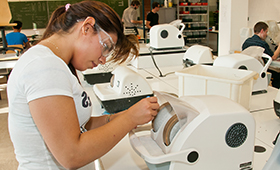Finding a training position via personal contact
BIBB analysis of success in the search for an apprenticeship position
49/2015 | Bonn, 10.12.2015

In addition to experience gained from work placements, it is personal contact which is most likely to prove successful in providing that foot in the door for young people en route to gaining a training po-sition. Support from careers advisers, parents and relatives often helps in finding an appropriate training position. These are the results of an analysis of the Federal Institute for Vocational Education and Training (BIBB) based on young people, surveyed in 2014, who were registered as training position applicants with the Federal Employment Agency (Federal Employment Agency/BIBB applicant survey 2014) These methods have actually gained in importance when compared to the survey undertaken in 2012. In 2012, for example, around one in five young people found a training position via a work placement, whereas in 2014, this became one in four.
The analysis shows that young men and women became aware of their training position using similar methods, however differences were apparent in the ranking of these methods. The work placement came top of the list for young men, while young women experienced careers guidance as particularly helpful. By contrast, over the two-year comparison, the track record of assistance provided by key individuals such as friends and others known to the young people has remained largely constant.
The differences shown according to school leaving qualification, which were already identified in 2012, have remained largely unchanged: The higher the school leaving qualification of the successful applicant, the more frequently they became aware of their training positions via the internet sites of the Federal Employment Agency or the training company. In contrast, successful applicants with a lower level school leaving qualification arrived at their training position significantly more frequently by means of a work placement. A company work placement was therefore a critical success factor in the search for a training position for 37 % young people with the maximum of a lower secondary school leaving qualification, but this was the case for only 13 % of those qualified for university entrance.
Further information is available in the article “Successfully gaining a training position” in the current issue 6/2015 of the BIBB journal “Vocational Training in Research and Practice – BWP”. The article can be downloaded free of charge from the internet at www.bibb.de/bwp-7841 (German only).
Contact partner at the BIBB:
Margit Ebbinghaus
Julia Gei
Specimen copy requested if printed.